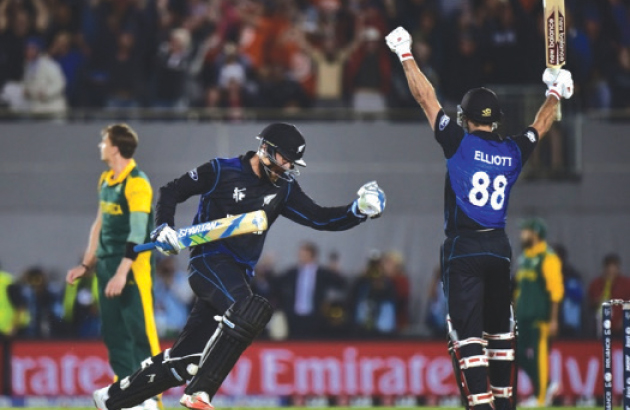DOWN TO THE WIRE!…Kiwi’s Elliott sinks Proteas to win thrilling semi-final


South African fast bowler Dale Steyn (left) watches helplessly as the penultimate ball of the match is whacked for a six while New Zealand’s Daniel Vettori and Grant Elliott (who hit it) celebrate reaching the World Cup final
The Black Caps’ dream lives on after they won what must rate as one of the most memorable of all World Cup games by four wickets. Grant Elliott, perceived by some to be the weak link in the New Zealand batting, ended a wonderful, pulsating semi-final by hitting the penultimate ball of the game from the finest fast bowler on the planet high over wide long-on and into the heaving stands to set 40,000 people into raptures.
As the ball sailed over the boundary, Elliott raised his arms aloft. It was, said the South Africa captain AB de Villiers afterwards, scarcely holding back the tears, the shot of his life. Dale Steyn, who had been treated harshly in previous overs, sank to his haunches in utter despair. Yet again South Africa have fallen at a hurdle they found insurmountable. We said there was nothing between the sides but this was astonishing. Perhaps the magnificent crowd and the support of the entire nation made the crucial difference.
This superb match was rain-interrupted at a time that will have benefited the Kiwis, and was reduced to 43 overs a side, South Africa having made 281 for five. Under the Duckworth-Lewis method, New Zealand were required to make 298 to win or, technically, one fewer because a tie would have taken them through. Elliott ensured that was not necessary, and finished with 84 from 73 balls with seven fours and three sixes.
There was a wonderful contribution from Brendon McCullum, whose 59 from 26 balls kickstarted the run chase, and from Corey Anderson too, his 58 helping add a fifth-wicket partnership of 103 from 98 balls that resurrected the innings at a time when it seemed that South Africa might take control. Earlier, Faf du Plessis had made 82, De Villiers an unbeaten 65 and David Miller a brutal 49 from only 18 balls to see South Africa to what appeared to be a formidable total.
New Zealand can now look forward to the trip across the Tasman to Melbourne for the final on Sunday, the first time they will have left the country during this tournament. South Africa can return home with heads held high, though. This was no choke. De Villiers has a superb side who on the day were beaten by another of the same calibre.
For a chase of this nature, it needed leadership from the front and, almost inevitably, it came from McCullum, a man who is close to canonisation in this neck of the woods. McCullum swashed and buckled, hitting Steyn out of the attack and helping add 71 for the first wicket inside seven overs. Suddenly the target looked in range.
In the end, two moments changed the course of the match. When he had 33, Anderson, stranded mid-pitch, should have been run out, but De Villiers stumbled over the stumps and fumbled the chance. Then, in the penultimate over, Elliott skied Morne Morkel to deep square leg, where two fielders, Farhaan Behardien and JP Duminy, converged and neither took the chance. These are the pressure situations that define games.
Having lost two wickets to Trent Boult and the new ball at the start of the match, South Africa rebuilt their innings superbly. De Villiers sent Rilee Rossouw in at No4 rather than himself, and together he and Du Plessis were able to add 83 before Rossouw was spectacularly caught by Guptill at backward point, after McCullum, searching for something with which to break the stand, brought on Anderson, his fifth bowling change in as many overs at one end.
Now though, De Villiers was freed from the necessity to mend the early damage, and with Du Plessis anchoring things, he began to play an expansive hand, the pair having added 102 for the fourth wicket by the time the rain began to fall in the middle of the second power play and the players were forced from the field. At that stage, although McCullum persisted with attacking, New Zealand had started to look a little rattled: half-chances had gone down, and a run-out missed, so that the break allowed them a chance to regroup, knowing that with De Villiers poised as he was on 60 already, a shortened match would surely suit them more than the opposition.
They could not have legislated for what followed, however, as for the remaining five overs, the South Africa captain was little more than a spectator as 65 runs were added of which he contributed five. It began when Du Plessis was caught behind off Anderson straight after the resumption, whereupon David Miller set about the bowling with such thunderous strokes that he had made 49 from 18 balls, with six fours and three sixes, before he too edged to the keeper. — The Guardian








Comments